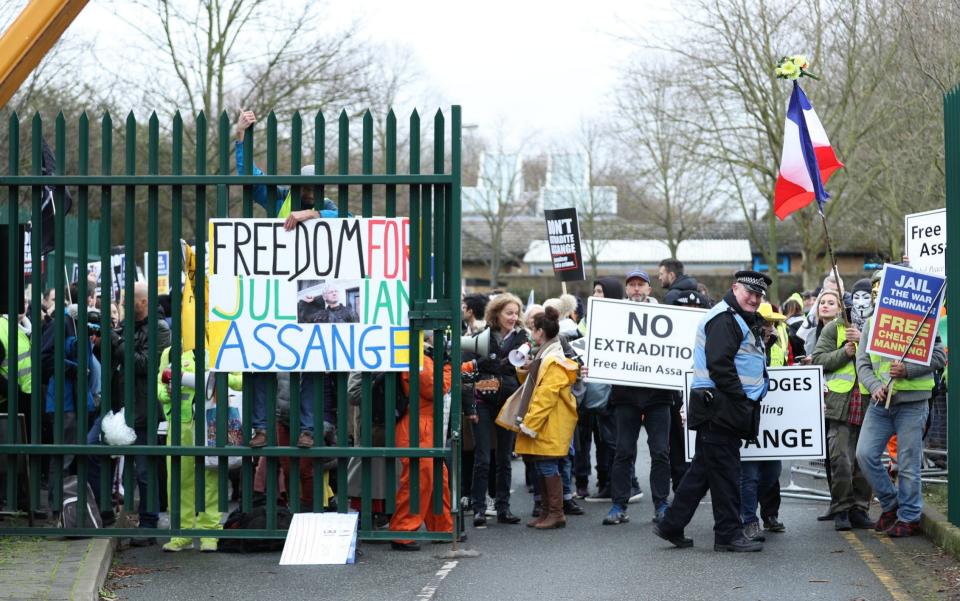Julian Assange 'put lives at risk' by publishing classified documents, court hears

Julian Assange helped Osama Bin Laden hunt American informants in the Middle East by publishing classified documents online, a court has heard, as a lawyer representing the US government said some sources "subsequently disappeared".
WikiLeaks founder Assange is facing extradition to the United States on 17 charges related to obtaining and disclosing US defence information and one of conspiring with Chelsea Manning to hack a government computer.
The Australian could face a 175-year prison sentence, according to his lawyers.
Over a cacophony of shouts through loudhailers, sirens and whistles from around 100 protesters standing in the rain outside Woolwich Crown Court, District Judge Vanessa Baraitser heard that 48-year-old Assange "likely put human rights activists, journalists, advocates, religious leaders, dissidents and their families at risk of serious harm, torture or even death" by disseminating the materials in an unredacted form.
James Lewis QC, acting on behalf of the US government, outlined how documents that had only been made public by WikiLeaks had been recovered at Bin Laden's Abbottabad compound. He said that was clear evidence that the material Assange published "was useful to the enemies of the United States of America".
Mr Lewis added that a 2010 New York Times article entitled 'Taliban study WikiLeaks to hunt informants' explicitly showed how the organisation was using Assange's site.
"The US is aware of sources, whose redacted names and other identifying information were contained in classified documents published by WikiLeaks, who subsequently disappeared," he said. "Although the US can't prove at this point that their disappearance was the result of being outed by WikiLeaks."
Mr Lewis said most of the charges relate to "straightforward criminal activity", which he described as a "conspiracy to steal from and hack into" the Department of Defence computer system along with former US Army intelligence analyst Manning.
"These are ordinary criminal charges and any person, journalist or source who hacks or attempts to gain unauthorised access to a secure system or aids and abets others to do so is guilty of computer misuse," he said. "Reporting or journalism is not an excuse for criminal activities or a licence to break ordinary criminal laws."
The clean-shaven Assange appeared in the dock wearing glasses, a grey suit, white shirt and grey jumper. He gestured to supporters in the public gallery including his father, John Shipman.
At one point, he stood up to tell the judge: "I'm having difficulty concentrating. All this noise is not helpful either. I understand and am very grateful of the public support and understand they must be disgusted."

Outside, the crowd had grown, with the fashion designer Dame Vivienne Westwood – who called herself "the angel of democracy" – among those present.
Edward Fitzgerald QC, representing Assange, outlined his defence on Monday, saying the prosecution "is not motivated by genuine concern for criminal justice but by politics".
Mr Fitzgerald argued that the extradition request was part of a wider political war on journalists under President Donald Trump, saying: "The Trump administration has decided to make an example of Julian Assange. He was the obvious sign of everything Trump condemned."
Outlining Assange's fragile mental health, the barrister argued that extradition would be the "height of inhumanity" and cited a medical report that said: "If extradition to the United States were to be imminent, Mr Assange would find a way of suiciding."
The lawyer later said Assange's actions had been misrepresented and told the court: "It's completely misleading to suggest it was Julian Assange and WikiLeaks to blame for the disclosure of unredacted names. WikiLeaks only published the unredacted material after they had been published by others who have never faced prosecution."
Mr Fitzgerald told the court that Assange did not assist Manning in accessing or decoding the leaked documents.
The defence lawyer also claimed Assange had been offered "a preemptive pardon" in exchange for helping the US President finding the source of the Democratic National Committee leaks, known as "the Russia investigation".
The court heard how an unnamed witness said the US was not content with just monitoring Assange in the Ecuadorian embassy but that "there were conversations about whether there should be more extreme measures contemplated, such as kidnapping or poisoning Julian Assange in the embassy".
The extradition hearing will be adjourned at the end of this week of legal argument and continue with three weeks of evidence, which are scheduled to begin on May 18. The eventual decision, expected months later, is likely to be appealed against by whichever is the losing side.
Assange has been held on remand in Belmarsh prison since September after serving a 50-week jail sentence for breaching his bail conditions while in the Ecuadorian embassy in London.
He entered the embassy in 2012 to avoid extradition to Sweden over sex offence allegations, which he had always denied and which were subsequently dropped.

